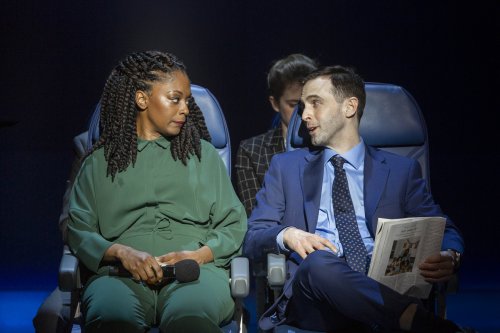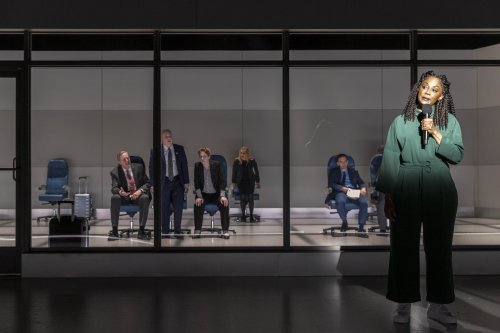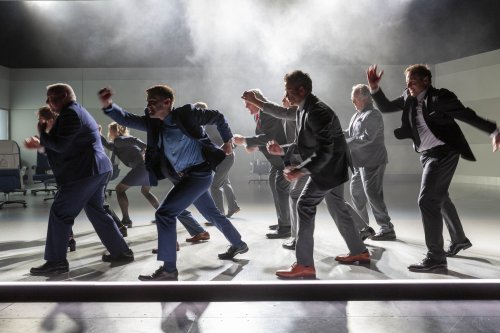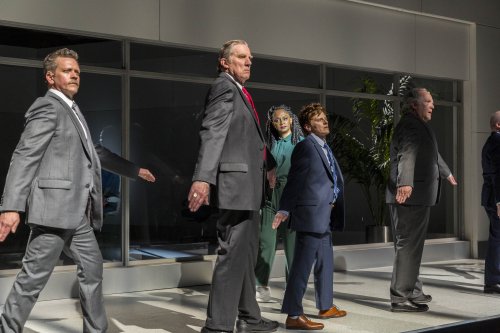Help
How to classify The Shed’s production of Claudia Rankine’s “Help,” inspired by her controversial New York Times article: a docudrama, an illustrated lecture, a polemic?

April Matthis and Joseph Medeiros in a scene from Claudia Rankine’s “Help” at The Shed (Photo credit: Kate Glicksberg; Courtesy: The Shed)
[avatar user=”Victor Gluck” size=”96″ align=”left”] Victor Gluck, Editor-in-Chief[/avatar]
It is difficult to know how to classify The Shed’s production of Claudia Rankine’s “Help,” inspired by her controversial New York Times article, “Brief Conversations with White Men,” which appeared on July 17, 2019, or its online version, “I Wanted to Know What White Men Thought About Their Privilege. So I Asked.” Is it a docudrama, an illustrated lecture, a polemic? In any case, Taibi Magar’s imaginative and innovative production helps make this riveting theater, though probably a bit too long as it is only about the one thing, thoughts on white male privilege. The 12-actor ensemble includes 9 white men, two white women and one Black actress, among them recognizable featured players April Matthis (Toni Stone, Fairview), Nick Wyman (Network, My Fair Lady), John Selya (Movin’ On, Come Fly Away), Tina Benko (Ivo van Hove’s The Crucible; The Roundabout Theatre Company’s The Rose Tattoo) and Charlotte Bydwell (“Lucy Michael” in Richard Nelson’s Michael plays).
Poet and Yale professor Rankine’s play makes use of a narrator/interviewer as her stand-in played by April Matthis. According to program notes by Rankine herself, “The text spoken by white people in the piece was primarily culled from responses to the Times article, public statements by men and women in the government and public life; and interviews conducted with white men by civil rights activists and theologian Ruby Sales; or documentary filmmaker Whitney Dow, or myself.” It also includes updates to the original script from “the January 6 insurrection and the global pandemic.” However, as the quotes are out of context they occasionally refer to entirely different issues as in former President Donald Trump’s saying “Such a nasty woman,” that was addressed to then candidate Hillary Clinton during one of the 2016 presidential debates.

April Matthis (Narrator) and the cast of Claudia Rankine’s “Help” at The Shed (Photo credit: Kate Glicksberg; Courtesy: The Shed)
Described in the program as taking place in “liminal spaces of airports and airplanes,” Mimi Lien’s set appears to be an airport waiting room with 12 moveable chairs, seen through a glass wall. Matthis remains on the outside of the wall on a microphone through most of the play until the glass wall disappears and she is seen as if on a plane talking to her neighbor. Among the quotes are some from liberal pundits James Baldwin, Dr. W.E.B. Du Bois, Bill Gates, Audre Lorde and conservative politicians Senator Ted Cruz, Senator Lindsey Graham, Rep. Marjorie Taylor Greene, and Senator Mitchell McConnell. The most surprising statements which are among the only ones identified in the play are racist statements by Thomas Jefferson, Abraham Lincoln and Martha Washington.
The innovative staging by director Magar includes actors lining up on a line as if to get ready to embark at a terminal, one-on-one interviews by the narrator as if seated on a plane, a solo dance for Twyla Tharp star John Selya by choreographer Shamel Pitts, and an unmotivated group promenade by the entire cast (labeled “Social Dance”) without the narrator as if in the waiting room. Another surprising event is all of them sailing around in the waiting room in their moveable chairs on casters. These events break up the text and make it into scenes. (The script actually divides the text up into three acts although there is no intermission.) Other intimate scenes that stand out are the narrator’s session with a female therapist and her at-home discussion with her white husband as to her experience on planes and in waiting rooms.

The cast of Claudia Rankine’s “Help” at The Shed (Photo credit: Kate Glicksberg; Courtesy: The Shed)
While the white actors do not play specific characters and remain fluid, some of the declarations are more memorable than others: Jeremy Webb as White Man #2 saying about the Black narrator on line ahead of him, “You never know who they’re letting into first class these days”; Joseph Medeiros as former Rep. Steve King, “White nationalist, white supremacist, Western civilization – how did that language become offensive?”; David Beach as Capt. Scott Arndt who demoted a white police captain for accusing him of using white male privilege; Bydwell as Amy Cooper, the woman in the Central Park birdwatching incident; Jess Barbagallo as Kyle Rittenhouse (“This case had nothing to do with race. It never had anything to do with race. It had to do with the right to self-defense. I’m not a racist person.”); Wyman as White Man #8 on his son’s not receiving Early Action to get into Yale University (“My son wants to go there but wasn’t accepted during the early-application process. It’s tough when you can’t play the diversity card.”)
Dede Ayite dresses the entire cast except for Matthis in sober business attire, while Matthis is in a matching green blouse and slacks, separate from the others. The lighting design by John Torres is extremely bright to designate a public place. While Chelsea Pace’s designation as intimacy coordinator is to be expected in our time, a new member of production teams is Nicole Brewer as “the anti-racist coordinator,” rather ironic in a play which is all about racism.

Tom O’Keefe, Nick Wyman, April Matthis (Narrator), Jess Barbagallo, and David Beach in a scene from Claudia Rankine’s “Help” at The Shed (Photo credit: Kate Glicksberg; Courtesy: The Shed)
While Matthis is commanding as the Narrator, she is rather too clinical in her approach to her text, stating all of her remarks in basically the same tone of voice. However, this may be intentional to set her apart as the impartial interviewer. Claudia Rankine’s Help which is intended as a cry of pain is startlingly revealing on one level, obvious on another. However, Taibi Magar’s production impresses the most as it makes what could have been a very dry lecture into something extremely novel and theatrical.
Help (March 15 – April 10, 2022)
The Griffin Theater at The Shed, 545 W. 30th Street, in Manhattan
For tickets, call 646-455-3494 or visit http://www.theshed.org
Running time: one hour and 40 minutes without an intermission






Leave a comment